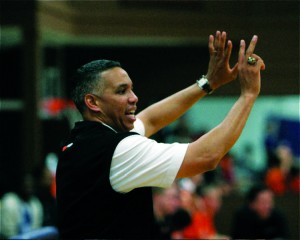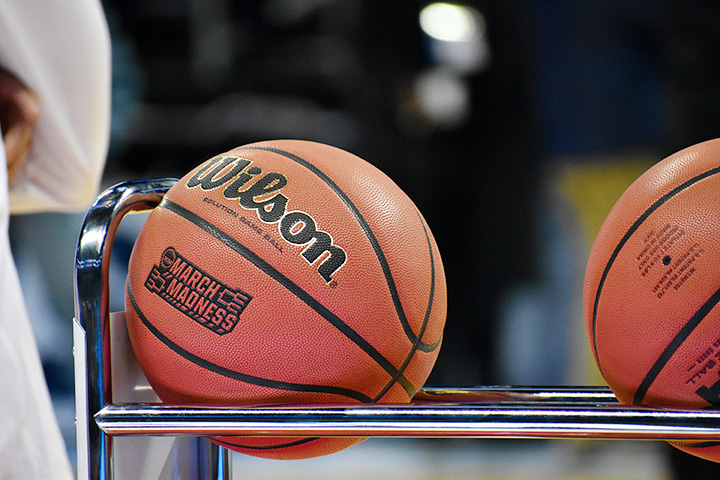Starting A Program From Scratch
 As a team-building exercise, many coaches across sports today have their players get together, watch a movie, then discuss it afterward. Players tend to focus on how the characters struggled, survived, worked together and thrived. Typically, the movie session ends, the coach hopes the players take something from the exercise and everyone moves forward with their business.
As a team-building exercise, many coaches across sports today have their players get together, watch a movie, then discuss it afterward. Players tend to focus on how the characters struggled, survived, worked together and thrived. Typically, the movie session ends, the coach hopes the players take something from the exercise and everyone moves forward with their business.
A few years ago at Montverde Academy (Fla.), head boys basketball coach Kevin Sutton popped in the movie “Hotel Rwanda” for his team to view. The players watched intently as the terrifying images of repression flashed across the screen. Then, when the film was over, instead of going their separate ways, five team members stood up and talked about their time trying to survive in Rwanda. At Montverde Academy, international and American students work together, play basketball together and learn from each other’s experiences, which makes it unlike most high schools in the United States.
“The international students are the majority on this team,” says Sutton, whose team last year featured five players from Africa, two from Russia, one from Asia and seven from the United States (four from Florida, one from Georgia, one from Puerto Rico and one from California). “We celebrate our diversity at the academy and our learning goes beyond the classroom and the court. We learn from each other.”And while the school has achieved tremendous success on the court in the six years since Sutton started the program, including a 140-25 record that includes recognition as 2007 National Champions from HoopsUSA.com, a national ranking for five years in a row and 26 student-athletes who have earned basketball scholarships, Montverde is not simply a basketball factory.
“We are a private, independent, international college-prep school in that our curriculum is designed to prepare students for college,” Sutton explains about Montverde, which opened in 1912 and currently sits on a 125-acre campus. “We are part of a state association. We are a ‘regular’ high school. We’re just unique in that we have so many cultures represented on this team. It’s truly a microcosm of the world. Our school was built on this ideal and our team lives by it.”
Building A New Program
Sutton started his coaching career as a graduate assistant at James Madison University, from where he graduated in 1988. His first high-school coaching job came immediately thereafter when he was hired by the legendary Stu Vetter to work as an assistant at Flint Hill Preparatory School (Falls Church, Va.). Sutton remained with Vetter as he moved on to Harker Preparatory School (Potomoc, Md.) in 1990 and St. John’s Prospect Hall (Frederick, Md.) in 1992. Sutton eventually helped with the start of the program at Montrose Christian (where Vetter now coaches) and after a two-year stint as an assistant (under Jeff Capel II) at Old Dominion University, he started his own program at Bishop McNamara High (Forestville, Md.). He did this until 2003 when he helped create the basketball team at Montverde.
“I learned a lot working with Stu Vetter and it was from him that I learned how to start a program,” Sutton says. “Plus, I had great coaches growing up. They always checked on my grades and instilled discipline. I always thought to myself that I wanted to be like that when I had the opportunity to coach my players. My goal always has been to develop relationships and impact lives in the game of basketball.
“And, when given the chance, I decided to take a holistic approach to coaching basketball by building around first-class, quality people who are respectful young men and who are serious about academics.”
Sutton has done that with his collection of national and international players. While not knocking the players from the United States, Sutton says his international players understand the educational opportunity presented to them at Montverde. Many of his players are the first in their families to even think about going to college. So, when he says that his players are serious about academics, he’s telling the truth, as in his six seasons he’s had 37 players on the honor roll.
“Their parents (international players) understand the importance of education, which is why they send them here. Education is valued, so those players come here with a sense of purpose. It’s a great opportunity for them.”
And, those players are coming here on their own, Sutton says emphatically. He says he’s never been to Africa on a recruiting trip, he’s not involved in the admissions process and he’s not recruiting anyone from another country to play basketball at Montverde.
“Montverde has a tremendous word-of-mouth reputation around the world now,” Sutton explains. “We have a global reputation. That said, I don’t recruit. Some of my former players are more than willing to talk to potential students from their home country based on the experience they had here but I’m not involved in that.
“I’m here to coach basketball to the players who come to this school.”
Successful Style
What makes Sutton’s accomplishments even more amazing is that the program is just six years old. Those national rankings, participation in national tournaments and having players go on to college via basketball scholarships all are a byproduct of the fundamentals and style of play Sutton stresses at Montverde.
“Kevin Sutton is a top-notch basketball coach, clinician and skills instructor. He is, without question, one of the best I have ever seen and I am always honored to work with him,” adds Alan Stein, a professional strength and conditioning coach who crossed paths with Sutton while both worked at Montrose Christian. “He is an excellent teacher of the game, as well as a tremendous motivator. Coach Sutton can coach at every level — from junior high school to the NBA — and has an unparalleled passion for basketball and for helping young people.”
But while Sutton stresses the fundamentals, he also has to stress communication for his team. When you are featuring players from a variety of countries speaking numerous languages, simply communicating is difficult. “Our ESL (English As A Second Language) Program is very strong and we demand communication from our players. We define communication as ‘information given, received and understood.’ ” As the players work together to better understand one another, the one word everyone on the team is certain to know is “tempo,” as in, Montverde controls the tempo on the court…and it’s going to be fast.
“We have a system in place where I want players to play as hard as they can for as long as they can. We play 10 people every game and use a pressuring defense and offense. The standard has been set here and this style has enabled us to achieve state and national rankings, as well as send all of our seniors on to play basketball for free at the next level,” Sutton says.
All 29 of Sutton’s seniors during his time at Montverde have received a basketball scholarship to play at the Division I, II and III levels, at schools such as: Michigan State (Idong Ibok, 2004), UCLA (Luc Mbah a Moute, 2005), Wake Forest (L.D. Williams, 2006, and Gary Clark, 2007), Virginia Commonwealth (Franck Ndongo, 2006), George Washington (Joseph Katuka, 2007), Texas A&M (Dashan Harris, 2008), Vanderbilt (Steve Tchiengang, 2008), Washington State (Marcus Capers, 2008), Arizona State (Ruslan Pateev, 2009) and Auburn (Rob Chubb, 2009).
“I tell my players to use the game of basketball to better their lives and that’s what they are doing. I ask them to be trail blazers and to be the first person to do something. For many, they are the first person from their family to go on to college, which is a major accomplishment and source of pride.”












